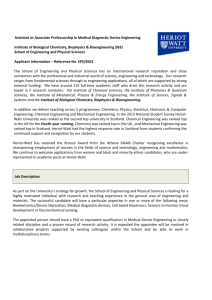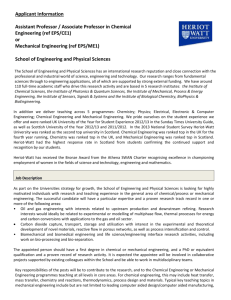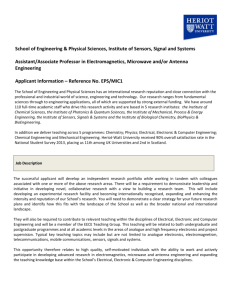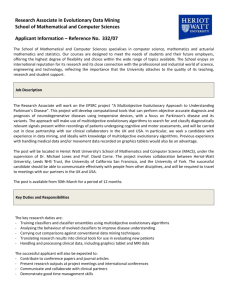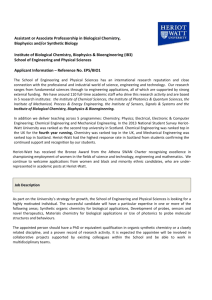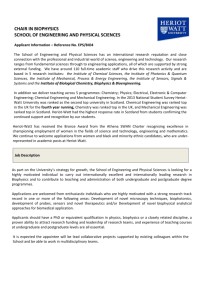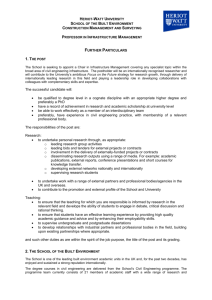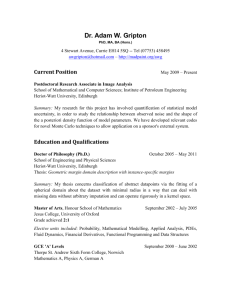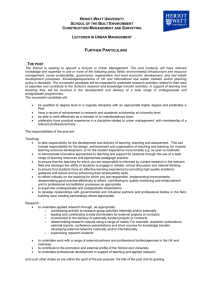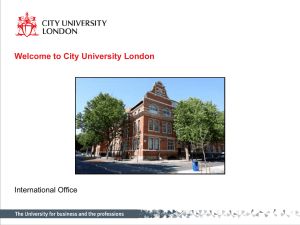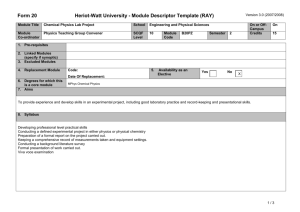Job Description - Heriot
advertisement
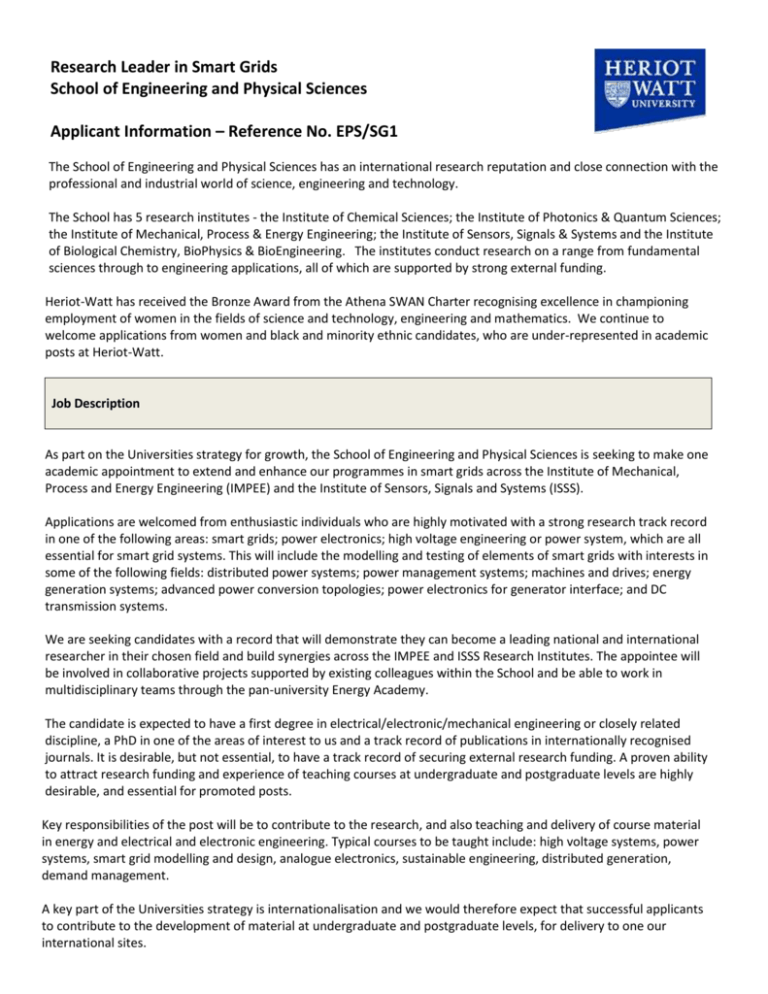
Research Leader in Smart Grids School of Engineering and Physical Sciences Applicant Information – Reference No. EPS/SG1 The School of Engineering and Physical Sciences has an international research reputation and close connection with the professional and industrial world of science, engineering and technology. The School has 5 research institutes - the Institute of Chemical Sciences; the Institute of Photonics & Quantum Sciences; the Institute of Mechanical, Process & Energy Engineering; the Institute of Sensors, Signals & Systems and the Institute of Biological Chemistry, BioPhysics & BioEngineering. The institutes conduct research on a range from fundamental sciences through to engineering applications, all of which are supported by strong external funding. Heriot-Watt has received the Bronze Award from the Athena SWAN Charter recognising excellence in championing employment of women in the fields of science and technology, engineering and mathematics. We continue to welcome applications from women and black and minority ethnic candidates, who are under-represented in academic posts at Heriot-Watt. Job Description As part on the Universities strategy for growth, the School of Engineering and Physical Sciences is seeking to make one academic appointment to extend and enhance our programmes in smart grids across the Institute of Mechanical, Process and Energy Engineering (IMPEE) and the Institute of Sensors, Signals and Systems (ISSS). Applications are welcomed from enthusiastic individuals who are highly motivated with a strong research track record in one of the following areas: smart grids; power electronics; high voltage engineering or power system, which are all essential for smart grid systems. This will include the modelling and testing of elements of smart grids with interests in some of the following fields: distributed power systems; power management systems; machines and drives; energy generation systems; advanced power conversion topologies; power electronics for generator interface; and DC transmission systems. We are seeking candidates with a record that will demonstrate they can become a leading national and international researcher in their chosen field and build synergies across the IMPEE and ISSS Research Institutes. The appointee will be involved in collaborative projects supported by existing colleagues within the School and be able to work in multidisciplinary teams through the pan-university Energy Academy. The candidate is expected to have a first degree in electrical/electronic/mechanical engineering or closely related discipline, a PhD in one of the areas of interest to us and a track record of publications in internationally recognised journals. It is desirable, but not essential, to have a track record of securing external research funding. A proven ability to attract research funding and experience of teaching courses at undergraduate and postgraduate levels are highly desirable, and essential for promoted posts. Key responsibilities of the post will be to contribute to the research, and also teaching and delivery of course material in energy and electrical and electronic engineering. Typical courses to be taught include: high voltage systems, power systems, smart grid modelling and design, analogue electronics, sustainable engineering, distributed generation, demand management. A key part of the Universities strategy is internationalisation and we would therefore expect that successful applicants to contribute to the development of material at undergraduate and postgraduate levels, for delivery to one our international sites. Key Duties and Responsibilities Work activities will vary according to the requirements of the job and individual areas of teaching and research responsibility; however, general responsibilities are typically, but not restricted to, the following: actively engaging in research and actively contributing to the university’s research profile; publicising research through the preparation and submission of journal and conference papers and participating in academic conferences; supervising students and research associates’ research work; actively pursuing research funding through the development of quality grant proposals; contributing to teaching through the delivery of lectures, tutorials and laboratories; assessing students’ work; carrying out general academic administration including student recruitment and admissions, participation on committees and exam boards, taking responsibility for key administration tasks; designing, preparing and developing teaching materials, assessment material and methods; actively developing and implementing new teaching methods; mentoring students; undertaking continuous professional development (CPD) and participating in staff development activities; managing and supervising staff; representing the institution in a professional capacity, e.g. conferences, meetings, with industrial partners, etc; establishing collaborative research and teaching links outside the university via funding councils, industry, business and public bodies. The successful applicants will participate in the research, teaching and administration of EPS as directed by the Head of School at an appropriate level. Please note that this job description is not exhaustive, and the role holder may be required to undertake other relevant duties commensurate with the grading of the post. Activities may be subject to amendment over time as the role develops and/or priorities and requirements evolve. Contractual Information Job Title: Notified on appointment School/Service: Engineering and Physical Science Reporting to: Head of the Institute of Mechanical, Process and Energy Engineering Grade/Salary Range: • Assistant Professor (Grade 8) £37,756 - £45,053 or (Grade 7) £29,837 - £36,661 DOE Associate Professor (Grade 9) £46,440 - £53,765; Professorial (Grade 10) minimum £55,375 Pension Scheme: USS Duration of Post: Open ended Annual leave: 33 days plus 9 Buildings Closed Days Working Hours: Full time Disclosure Scotland Requirement: n/a Sickness benefits: up to 6 Months Full Pay, 6 Months Half Pay Start Date: August 2014 or as agreed Person Specification This section details the attributes e.g. skills, knowledge/qualifications and competencies which are required in order to undertake the full remit of the role. Attributes Essential Education & Qualifications (technical, professional, academic qualifications and training required) PhD CEng or working towards CEng status Certificates, CV Experience (Examples of specific experience sought. For Academic posts state type of publications expected as well as teaching, research, professional / industrial / commercial, consultancy, managerial and administrative experience ) Good range of quality journal publications in their chosen interest area. Experience of collaborative academicindustrial research projects. Application form and interview Demonstrates in-depth knowledge of fundamentals. Evidence of teaching engineering students modules in energy or electrical and electronic engineering. Research funding and making applications. Evidence of funding – achieved and applied for. Has future research plans in one or more of the stated areas. Competencies, Skills& Knowledge (e.g. effective communication skills, initiative, flexibility, leadership etc) Good, lucid, clear communicator. Good presentation skills. Desirable Means of Assessment Lecturing and assessment experience. Has acquired background knowledge of the University and the School. Demonstrates evidence of willingness to be involved in collaborative research. Team player. Interview and presentation. Feedback from academic staff. Has teaching and research experience in core engineering areas. Demonstrates willingness to participate in international delivery of programmes. Interview Shows leadership. Explains concepts well. Demonstrated initiative in teaching, and obtaining research funding. Other Attributes/Abilities (if applicable) Special Factors (if applicable) Interview Essential Criteria – these are attributes without which a candidate would not be able to undertake the full remit of the role. Applicants who do not clearly demonstrate in their application that they possess the essential requirements will normally be eliminated at the short listing stage. Desirable Criteria – these are attributes which would be useful for the candidate to hold. When short listing, these criteria will be considered when more than one applicant meets the essential criteria. Application Process If you would like to be considered for this opportunity, please submit your CV, publication list and a 1 page statement of how you meet the criteria in the person specification, to research-jobs@hw.ac.uk no later than1st of July 2014. For informal enquiries contact Prof Mercedes Maroto-Valer, Head of the Institute of Mechanical, Process & Energy Engineering at M.Maroto-Valer@hw.ac.uk . For all applications and correspondence about your application, please quote ref: EPS/SG1 The University is committed to equality of opportunity. Other Relevant Information The School of Engineering and Physical Sciences at Heriot-Watt University was founded in 2002, bringing together the disciplines of mechanical engineering; chemical engineering; electronic, electrical and computer engineering; physics; and chemistry. Professor Steve McLaughlin is the current Head of School. The School comprises around 120 academic staff, 80 research associates, 80 support staff, 230 postgraduate research students, 135 students on taught postgraduate courses and approximately 1600 undergraduate students in Edinburgh, 600 students in Dubai and 120 in Baku. The School has a turnover of around £43M, approximately one-quarter of that of the University, divided roughly equally between research and teaching. We pride ourselves on the student experience we offer and were ranked UK University of the Year for Student Experience 2012/13 in the Sunday Times University Guide, as well as Scottish University of the Year 2012/13 and 2011/2012. In the 2013 National Student Survey Heriot-Watt University was ranked as the second top university in Scotland. Chemical Engineering was ranked top in the UK for the fourth year running, Chemistry was ranked top in the UK, and Mechanical Engineering was ranked top in Scotland. Electrical Engineering received in 2013 the National Microelectronics Institute Award for the best UK Department in Electrical Systems and was ranked second in Scotland for Electrical Engineering. Heriot-Watt had the highest response rate in Scotland from students confirming the continued support and recognition by our students. The School is active in a wide range of research areas, supported by strong external funding. The appointee will be based in the Institute of Mechanical, Process and Energy Engineering (IMPEE) and with close collaborations with the Institute of Sensors, Signals and Systems (ISSS). IMPEE is a dynamic, multidisciplinary research Institute focused on promoting excellence across our main research themes: Energy Harvesting and Conversion, Biomedical Engineering and Multiphase Flow. Much of our work involves strong industrial links across a range of sectors and through our expertise, skills and experience we work together with industry to identify new areas of interest. We offer a stimulating environment for study and research, and a lively community of over 25 academics and around 75 postgraduates and research staff. We have extensive laboratory and workshop facilities and our staff are actively engaged in a range of high-profile research initiatives which also allow us to identify and grow new areas of interest. ISSS is an Institute with key research topics centred in micro engineering, microwave and antenna engineering, robotics and autonomous systems, energy and signal & Image processing. ISSS has around 23 members of staff, over 70 research staff and supports around £8M of active research projects, 90% of them having industrial partners. The Institute was recently awarded the best UK department in Electrical Systems by the National Microelectronic Institute. ISSS has extensive laboratories centred on high voltage engineering with the only high voltage laboratory left in Scotland. Energy research is a core activity at Heriot-Watt University. Through the pan-university Energy Academy, research excellence ranges from solar energy and energy-focused materials through to energy economics, use, policy and logistics. The perspective of energy research at the University and our interaction with the international agenda of climate change, sustainability and security of supply has informed a 'big picture' vision of how best to match our skills base to the emerging research and knowledge exchange challenges. Secure electricity supply is essential for all countries and smart grids systems are at the heart of the next generation of supply and control of electrical energy. This is going to be of increasing importance with increase electricity demand and the diversification of electricity generation. The internationally agreed targets for emission reduction, the emerging technologies for generation of electricity from renewable resources and the development of electrical vehicles require smart grids as a key tool for enabling these ambitious activities. The School is a full partner in three Scottish Higher Education Funding Council ‘research pooling initiatives’, in chemistry (‘ScotCHEM’), physics (the Scottish Universities Physics Alliance, SUPA) and in engineering and mathematics (with the University of Edinburgh, the ‘Edinburgh Research Partnership’, ERP). The School is organised into a number of research institutes to promote interdisciplinary research collaboration and teaching disciplines to delivery our Undergraduate programmes. The School’s undergraduate portfolio comprises 26 distinct accredited degree titles in our main disciplines and in interdisciplinary topics (plus degrees in Combined Studies) offered at the bachelor and undergraduate masters level. Recently, the EPS taught postgraduate activities have been brought together to form a graduate school which oversees the development of new MSc programmes utilising expertise within the School. In addition to the development and expansion of their research interests, successful applicants will contribute to the development and delivery of new taught programmes. An appointee without appropriate teaching experience would be expected to complete the Heriot-Watt University PG Certificate in Academic Practice. Heriot-Watt has a strong reputation with industry for our graduates and our practical research. We are especially pleased that Heriot-Watt is part of the world wide Chevron University Partnership Programme. There are currently 12 institutions across the world supported in this way by Chevron, and Heriot-Watt is the only institution in the UK with support for two undergraduate programmes, namely Chemical and Mechanical Engineering. Electrical and Electronic Engineering has a cohort of 200 undergraduate students and 50 taught postgraduate students. We offer a range of postgraduate taught programmes in the field of energy drawing on our research activities and exploiting synergies across the School and with other University Schools. Of particular relevance for this post are our MSc programmes in Smart Grid and Demand Management, Renewable Energy and Distributed Generation, Energy, Renewable Energy Engineering and Oil and Gas Technology. These programmes along with our undergraduate programmes are to be developed for delivery to students at our campuses in Edinburgh, Dubai and Malaysia. The successful candidate will have an opportunity to be involved with development and delivery of material on these new programmes. Heriot-Watt University and Values With a history dating back to 1821, Heriot-Watt University has established a reputation for world-class teaching and practical, leading-edge research, which has made us one of the top UK universities for business and industry. We’re a vibrant, forward-looking university, well known for the quality of our degrees with employers actively seeking out our graduates. Heriot-Watt is also Scotland’s most international university with an unsurpassed international in-country presence. We deliver degree programmes to 11,800 students in 150 countries around the world, have campuses in Dubai and Malaysia and boast the largest international student cohort in Scotland. At Heriot-Watt we’ve created an environment that nurtures innovation and leadership - where our researchers, staff and students can realise their potential and develop their ambitions. We’re proud of our collegiate atmosphere and integrated teaching and research approach which has helped to build a community of committed academics and highly motivated students. Our focus on careers delivers results and we’ve an excellent reputation for graduate employability. We have campuses in Edinburgh, the Borders, Orkney, Dubai and Malaysia where we aim to provide stimulating, supportive environments conducive to effective learning and research, and where staff and students can excel. At Heriot-Watt, we have an established set of values that help us to nurture innovation and leadership, and show our commitment to continuous improvement and development in all our activities. Our values describe our deeply held beliefs and our community spirit. They characterise not only how we are as a higher education institution but also frame how we want to be. Our values are: o o o o o Valuing and respecting everyone Pursuing excellence Pride and belonging Shaping the future Outward looking As a learning, living and working institution, we use our values as the building blocks of how we go about doing our work and how we conduct ourselves as part of Heriot-Watt University. They represent what binds us together as a University community and help us to become the best at what we do. It's key that all our staff feel part of our achievements, and our values provide your link to our success. For full details on our University please view our website, www.hw.ac.uk Heriot-Watt University is a charity registered in Scotland (SC000278).
